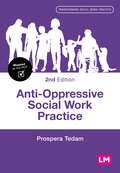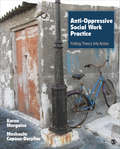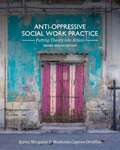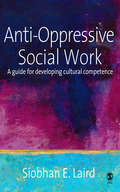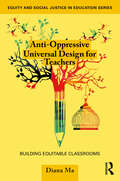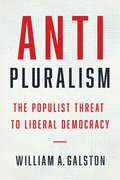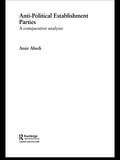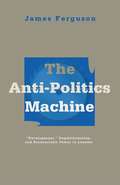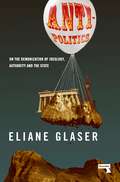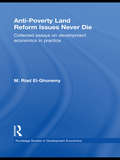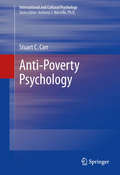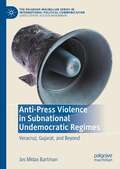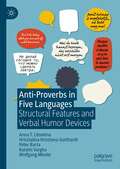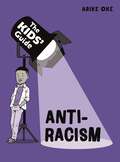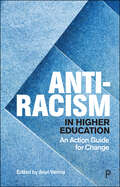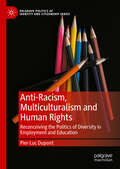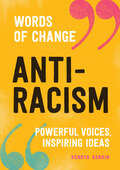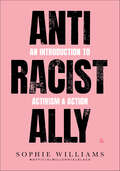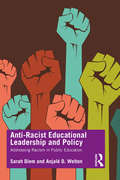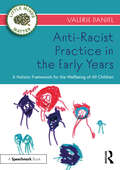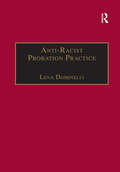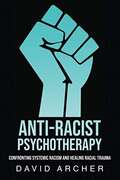- Table View
- List View
Anti-Oppressive Social Work Practice (Transforming Social Work Practice Series)
by Prospera TedamGrounded in principles and values of fairness and equality, anti-oppressive practice (AOP) lies at the heart of social work and social work education. This book will equip you with the tools and knowledge you need to address the concepts of diversity, oppression, power and powerless, and practice in ethically appropriate ways for contemporary social work practice.
Anti-Oppressive Social Work Practice: Putting Theory Into Action
by Karen L. Morgaine Moshoula J. Capous-DesyllasAnti-Oppressive Social Work Practice is the first text to fully integrate concepts of anti-oppressive practice with generalist practice course content. This comprehensive approach introduces concepts of social justice and offers detailed insight into how those principles intersect with the practice of social work at the micro, mezzo, and macro levels. The book covers ethics, values, and social work theory, and discusses the fundamentals of working with individuals, families, groups, organizations, and communities. The book also highlights policy and social movement activism and practice within a global context. Maintaining an integrative approach throughout, authors Karen Morgaine and Moshoula Capous-Desyllas effectively bridge the gap between anti-oppressive principles and practice, and offer a practical, comprehensive solution to schools approaching reaccreditation under the mandated CSWE Standards. ? “Provides an important step in the ongoing evolution of generalist practice in social work. It continues a rich tradition [that] challenges the profession to become more and more explicit about the revolutionary aspect of practice.” —Christian Itin, Metropolitan State University of Denver “Offers a fresh perspective of social work practice interventions.” —Terrence Allen, North Carolina Central University
Anti-Oppressive Social Work Practice: Putting Theory Into Action
by Karen L. Morgaine Moshoula J. Capous-DesyllasAnti-Oppressive Social Work Practice is the first text to fully integrate concepts of anti-oppressive practice with generalist practice course content. This comprehensive approach introduces concepts of social justice and offers detailed insight into how those principles intersect with the practice of social work at the micro, mezzo, and macro levels. The book covers ethics, values, and social work theory, and discusses the fundamentals of working with individuals, families, groups, organizations, and communities. The book also highlights policy and social movement activism and practice within a global context. Maintaining an integrative approach throughout, authors Karen Morgaine and Moshoula Capous-Desyllas effectively bridge the gap between anti-oppressive principles and practice, and offer a practical, comprehensive solution to schools approaching reaccreditation under the mandated CSWE Standards. ? “Provides an important step in the ongoing evolution of generalist practice in social work. It continues a rich tradition [that] challenges the profession to become more and more explicit about the revolutionary aspect of practice.” —Christian Itin, Metropolitan State University of Denver “Offers a fresh perspective of social work practice interventions.” —Terrence Allen, North Carolina Central University
Anti-Oppressive Social Work Practice: Putting Theory into Action
by Moshoula Capous-Desyllas Karen MorgaineAnti-Oppressive Social Work Practice: Putting Theory into Action applies anti-oppressive theories and concepts to a generalist social work practice model to provide students with tools to develop a critically evaluative and self-reflective social work practice. The text combines social welfare history, theory, skills and concrete examples of anti-oppressive practice in real-world settings to help students develop a personal practice that is grounded in an understanding of social justice and the need for social workers to interrogate their work and the institutions that they find themselves working in. <P><P>Opening chapters address social justice, values and ethics, and theory, and challenge students to critically examine their own social positions, identities, and values. Later chapters present fields of social work and social justice practice, from micro through macro, historical and ideological contexts, and a variety of skills and forms of practice. Within each chapter, Stories from the Field provide students with reflections from practitioners and participants on anti-oppressive practice and social justice work, highlighting personal successes and challenges. <P><P>The second edition includes new material on environmental and ecological justice, the ethics of care, feminist theoretical approaches, the non-profit industrial complex and other contemporary topics. This edition also incorporates additional Stories from the Field, an expanded section on tools and approaches to family work, as well as additional supplemental films, readings, and organizational resources. <P><P>Anti-Oppressive Social Work Practice is an ideal text for foundational courses in social work that approach multi-level practice from a decolonizing perspective.
Anti-Oppressive Social Work: A Guide for Developing Cultural Competence
by Siobhan Laird`This is an exciting and valuable book. In considering the role and importance of cultural competence in professional practice with diverse populations, it provides a refreshing and much needed approach to social work theory and practice' - Kwame Owusu-Bempah, Reader in Psychology, University of Leicester Anti-Oppressive Social Work: A Guide for Developing Cultural Competence aims to improve social work training and practice by arguing that a thorough understanding of people's values, social norms and family arrangements are crucial to achieving culturally sensitive practice. The book moves beyond traditional conceptions of anti-oppressive and anti-racist practice by exploring the cultural heritages of some of the main ethnic minorities living in the United Kingdom, and by identifying the many forms that racism can take. The book includes: " an introduction to the context and history of ethnic minorities living in Britain " a discussion of the nature of racism " individual chapters on: communities with roots in India, Pakistan, Bangladesh, the Caribbean, and China. " a separate chapter on economic migrants, refugees and asylum seekers " a range of practice examples which encourage students and practitioners to identify general principles which underpin cultural competence. Critical, yet acessible, the book opens up possibilities for more culturally aware and more effective social work practice. It will be essential reading for all those training to become social workers as well as practitioners wishing to engage with fresh perspectives on anti-oppressive practice. Siobhan Laird is a lecturer in social work at the University of Sheffield. She has previously worked in practice and academic roles in Northern Ireland and Ghana.
Anti-Oppressive Universal Design for Teachers: Building Equitable Classrooms (Equity and Social Justice in Education Series)
by Diana MaAnti-Oppressive Universal Design for Teachers: Building Equitable Classrooms provides a student-centered, culturally responsive blueprint for building sustainable and just educational practices. Marginalized students face complex educational barriers, and undoing educational injustice requires intentional practices designed to be explicitly anti-oppressive. Yet schools continue to adopt trendy “one size fits all” practices that benefit only some. This is not equity.Author Diana Ma presents a framework that takes the principles of equity and humanizing pedagogy from anti-oppressive theories and the principles of multiplicity and flexible design from Universal Design for Learning (UDL). Together, these principles form a framework designed to dismantle specific systemic oppression. The Anti-Oppressive Universal Design framework is designed for educators who want to build practices that work for all students.The book’s flexible design tools will help teachers create anti-oppressive and equitable education that frees students to be their full authentic selves in the classroom. In addition, there are classroom strategies and stories to show how this model benefits both students and teachers, providing sustainable alternatives to prescriptive practices.
Anti-Pluralism: The Populist Threat to Liberal Democracy (Politics and Culture)
by William A. GalstonThe Great Recession, institutional dysfunction, a growing divide between urban and rural prospects, and failed efforts to effectively address immigration have paved the way for a populist backlash that disrupts the postwar bargain between political elites and citizens. Whether today’s populism represents a corrective to unfair and obsolete policies or a threat to liberal democracy itself remains up for debate. Yet this much is clear: these challenges indict the triumphalism that accompanied liberal democratic consolidation after the collapse of the Soviet Union. To respond to today’s crisis, good leaders must strive for inclusive economic growth while addressing fraught social and cultural issues, including demographic anxiety, with frank attention. Although reforms may stem the populist tide, liberal democratic life will always leave some citizens unsatisfied. This is a permanent source of vulnerability, but liberal democracy will endure so long as citizens believe it is worth fighting for.
Anti-Political Establishment Parties: A Comparative Analysis (Extremism and Democracy)
by Amir AbediFirst Published in 2003. Routledge is an imprint of Taylor & Francis, an informa company.
Anti-Politics Machine: Development, Depoliticization, and Bureaucratic Power in Lesotho
by James FergusonDevelopment, it is generally assumed, is good and necessary, and in its name the West has intervened, implementing all manner of projects in the impoverished regions of the world. When these projects fail, as they do with astonishing regularity, they nonetheless produce a host of regular and unacknowledged effects, including the expansion of bureaucratic state power and the translation of the political realities of poverty and powerlessness into "technical" problems awaiting solution by "development" agencies and experts. It is the political intelligibility of these effects, along with the process that produces them, that this book seeks to illuminate through a detailed case study of the workings of the "development" industry in one country, Lesotho, and in one "development" project. Using an anthropological approach grounded in the work of Foucault, James Ferguson analyzes the institutional framework within which such projects are crafted and the nature of "development discourse," revealing how it is that, despite all the "expertise" that goes into formulating development projects, they nonetheless often demonstrate a startling ignorance of the historical and political realities of the locale they are intended to help. In a close examination of the attempted implementation of the Thaba-Tseka project in Lesotho, Ferguson shows how such a misguided approach plays out, how, in fact, the "development" apparatus in Lesotho acts as an "anti-politics machine," everywhere whisking political realities out of sight and all the while performing, almost unnoticed, its own pre-eminently political operation of strengthening the state presence in the local region.James Ferguson is an associate professor of anthropology at the University of California at Irvine.
Anti-Politics: On the Demonization of Ideology, Authority and the State
by Eliane GlaserAn analysis of the rise of populism and the disavowal of politics in the West in recent years.In recent years, the West has seen a rising tide of populist and anti-political feeling. Figures like Donald Trump and Nigel Farage have gained power by distancing themselves from “the establishment” and portraying politics itself as the enemy of the people. And it’s not just them — increasingly, the media and politicians of all stripes hurl the word “ideological” as an insult, tie themselves in knots to avoid mentioning “the working class,” and champion the “depoliticising of key decision-making.” In this book, Eliane Glaser — one of the early commentators to call attention to this new wave of populism — takes stock of how we got here and where we’re going. At the heart of this is a vital question: Is the “death of politics” simply an inevitable sign of the times, going hand in hand with climate change, technological development and postmodern malaise? Or is it the intentional result of right-wing engineering? In addressing this question, Glaser shows how forces on the Right have manipulated and benefitted from the apathy of anti-politics; and how the Left’s move to centre under neoliberal leaders has helped in the process. She argues that in order to revive productive engagement and hope for the future, we need to return to three pillars of political philosophy that have become dirty words: ideology, authority and the state. Glaser puts forward a strong and galvanising defence of these foundations, showing that however unpopular they may be, they’re necessary for the functioning of a fair society.
Anti-Poverty Land Reform Issues Never Die: Collected essays on development economics in practice (Routledge Studies in Development Economics)
by M. Riad El-GhonemyWhat can we do to unlock the unrealised potential of the hundreds of millions of rural poor and landless workers? The ever-topical central theme in this collection of essays is the mixed role of government and the institutionally regulated market in tackling rural poverty and land distribution inequality. Drawing on over half a century of M. Riad El-Ghonemy’s academic and field experience in developing countries across Africa, Latin America, the Middle East and South East Asia, this is a comprehensive record of the late-twentieth century study of and struggle against rural inequality, seen through the eyes of one of its foremost observers. Containing a balance of in-depth field studies and El-Ghonemy’s personal observations from 1952 onwards, this volume provides the basis for discussion and debate on a range of developmental issues. Foremost among these is the appropriate approach both to explain the factors underlying developing countries' rural backwardness, and to enable them to achieve the Millennium Development Goal of halving the incidence of poverty and hunger by 2015. The compelling argument made here is that redistributive land reform, combined with non-farm intensive employment opportunities and investment in education within rural areas are necessary to tackle persistent poverty effectively. Anti-Poverty Land Reform Issues Never Die is essential reading for undergraduate and postgraduate students learning rural development and institutional and development economics. M.Riad El-Ghonemy is Senior Research Associate at the Department of International Development, University of Oxford and Research Fellow at the Department of Economics, the American University in Cairo, and Emeritus Professor, Ein-Shams University, Cairo. He is the author of several publications, including The Political Economy of Rural Poverty, Routledge (1990).
Anti-Poverty Psychology (International and Cultural Psychology)
by Stuart C. CarrPsychology has focused more on personalities in poverty -- pathologizing -- than on contexts for poverty reduction (Pick & Sirkin, 2010). As a result, the discipline has inadvertently sequestered and isolated itself, and its potential contribution, from poverty reduction initiatives - globally and locally. In recent years, there have been major developments in both the scope and depth of psychological research on global development issues. Some of the key developments include significant advances in understanding of what motivates teachers in schools, on designing community interventions to promote health, and on managing the development of human "capacity" in aid and development projects. The Psychology of Poverty Reduction is poised to capture such advances in the understanding of 'what works' - and what does not.
Anti-Press Violence in Subnational Undemocratic Regimes: Veracruz, Gujarat, and Beyond (The Palgrave Macmillan Series in International Political Communication)
by Jos Midas BartmanThe global trend of increasing violence against the press has spurred research interest into the questions of where, why, and how communicators are repressed. As a result, scholarship has demonstrating that hybrid regimes - which mix undemocratic and democratic elements - constitute a specifically dangerous and lethal context for these actors. Decentralized countries, in which some subnational political elites have retained authoritarian features, have been identified as the most perilous context for communicators. However, despite the burgeoning interest in illiberal practices and repression on the subnational level, it is still relatively unexplored how and why subnational political elites repress communicators within their multi-level setting. The author argues that communicators in subnational undemocratic regimes who can spread the scope of compromising information beyond subnational boundaries can cause uncertainties for subnational undemocratic regimes. The book explores how the political elites of these regimes repress these communicators in response.
Anti-Proverbs in Five Languages: Structural Features and Verbal Humor Devices
by Wolfgang Mieder Anna T. Litovkina Hrisztalina Hrisztova-Gotthardt Péter Barta Katalin VarghaThis book is the first comparative study of English, German, French, Russian and Hungarian anti-proverbs based on well-known proverbs. Proverbs are by no means fossilized texts but are adaptable to different times and changed values. While anti-proverbs can be considered as variants of older proverbs, they can also become new proverbs reflecting a more modern worldview. Anti-proverbs are therefore a lingo-cultural phenomenon that deserves the attention of cultural and literary historians, folklorists, linguists, and general readers interested in language and wordplay.
Anti-Racism (Critical Studies In Racism And Migration Ser.)
by Alastair BonnettThis introductory text provides students for the first time with an historical and international analysis of the development of anti-racism. Drawing on sources from around the world, the author explains the roots and describes the practice of anti-racism in Western and non-Western societies from Britain and the United States to Malaysia and Peru. Topics covered include:* the historical roots of anti-racism* race issues within organisations* the practice of anti-racism* the politics of backlash.This lively, concise book will be an indispensable resource for all students interested in issues of race, ethnicity and in contemporary society more generally.
Anti-Racism (The Kids' Guide)
by Arike OkeThis book will tell you more about what racism is and how to stop it happening. Maybe you are being bullied and you think it could be racial bullying. Perhaps you know someone who is being treated badly because of racism, and you want to help them. Perhaps you are worried that you might be behaving in a racist way and you want to know how to stop.Being anti-racist means being active against racism. This book gives some tips about how to be anti-racist in a positive and safe way. This book can help you spot racism and stop it in its tracks. If everyone bandstogether then we can make racism become ... extinct!Other titles in The Kids' Guide series:Anti-BullyingDealing with AnxietyDealing with DivorceDealing with DeathUnderstanding Autism
Anti-Racism in Higher Education: An Action Guide for Change
by Arun VermaHow is your institution enabling Black, Asian and minority ethnic staff and students to thrive? Is your institution effectively tackling racism? Following the 2020 Black Lives Matter movement, the higher education sector has started making bold commitments to dismantling structural racism. However, big questions remain about how higher education can combat institutional racism and achieve real change. This book disrupts the higher education sector through ambitious actions and collective, participatory and evidence-informed responses to racism. It offers a roadmap for senior leaders, staff and students to build strategies, programmes and interventions that effectively tackle racism. Arising from current staff and recent student experiences, this book supports institutions driving equality, diversity, inclusion and intersectional programmes in higher education.
Anti-Racism, Multiculturalism and Human Rights: Reconceiving the Politics of Diversity in Employment and Education (Palgrave Politics of Identity and Citizenship Series)
by Pier-Luc DupontThe continuing prevalence of racial inequality and discrimination is well documented in Britain. While there are multiple accounts of how state institutions are shaped by and reproduce racism, much less has been said about their current and potential contribution to anti-racism. This book elucidates the long-term impact on racism of positive action in employment and multicultural school curricula. It also explores whether international human rights law creates a duty for states to adopt these policies. Positive action and multicultural curricula are not new and have long been advocated by multiculturalists, but this book systematically unpacks how they can counter four structural drivers of racism: racialised national identities, racialised power inequalities, racial fearmongering, and racial segregation. The book goes on to examine the extent to which they have been implemented in Britain, as well as the legal and political opportunities for future development.
Anti-Racism: Powerful Voices, Inspiring Ideas (Words of Change)
by Kenrya RankinA celebration of resistance and stirring call for racial equity, this inspiring collection gathers the most enlightening writings of anti-racist activists like Ibram X. Kendi, Robin DiAngelo, and Ta-Nehisi Coates &“The day I stop fighting for equality and for people that look like you and me will be the day I'm in my grave.&” —Serena Williams Now more than ever, the fight for racial justice requires all of us to participate, not just during Black History Month, but every day of the year. This collection of stirring quotes from anti-racist activists is a call to action and a blast of truth. In these pages readers will find understanding and inspiration to end racial injustice. Journalist and activist Kenrya Rankin&’s powerful introduction explains how systemic racism poisons the atmosphere for everyone, while her selection of vibrant quotes illuminates and honors the work of anti-racist leaders past and present. Beautifully presented quotes and capsule biographies of the activists make this book a perfect gift or resource for students, educators, librarians, advocates, and allies who seek social justice and promote anti-racism. Voices include: Jason Reynolds, Ibram X. Kendi, Adrienne Maree Brown, Roxane Gay, Ta-Nehisi Coates, Alexandria Ocasio-Cortez, Amandla Stenberg, Elaine Welteroth, Franchesca Ramsey, Rosa Clemente, Robin DiAngelo, Darnell Moore, W.Kamau Bell, Lizzo, Opal Tometi, Audre Lorde, Malcolm X, Buffy Sainte-Marie, Frederick Douglass, Megan Rapinoe, Laverne Cox, and many more! Partial proceeds to benefit The Movement for Black Lives Fund.
Anti-Racist Ally: An Introduction to Activism & Action
by Sophie WilliamsJoin the fight for racially marginalized people with this pocket-sized guide filled with practical insights from one of the leading voices of the movement for equality and founder of the @officialmillennialblack Instagram.As the tragic murder of George Floyd and the Black Lives Matter movement has demonstrated, not being racist is not enough. To fulfill the American ideal, to ensure that all people are equal, you must be actively anti-racist. In this essential guide, Sophie Williams, goes beyond her popular Instagram @officialmillennialblack, providing sharp, simple, and insightful steps anyone can take to be a better ally in the fight against racism. While the book’s focus is on race, it also touches on sexism, classism, ableism, oppression, and white supremacy. Written in her iconic Instagram style, this pocket-sized guide is a crucial starting point for every anti-racist ally, covering complex topics at the heart of anti-racist principles. Whether you are just finding your voice, have made a start but aren’t sure what to do next, or want a fresh viewpoint, Anti-Racist Ally introduces and explains the language of change and shows you how to challenge the system, beginning with yourself. Sophie reminds you that this is a learning process, which means facing difficult truths, becoming uncomfortable, and working through the embarrassment and discomfort. The fight for justice isn’t easy there aren’t any shortcuts or quick wins. But together, anti-racist allies can use their power to truly change the world and lives.
Anti-Racist Educational Leadership and Policy: Addressing Racism in Public Education
by Sarah Diem Anjalé D. WeltonAnti-Racist Educational Leadership and Policy helps educational leaders better comprehend the racial implications and challenges of the current educational policy landscape. Each chapter unpacks a policy issue such as school choice, school closures, standardized testing, discipline, and school funding, and analyzes it through the racialized and market-driven lenses of the current leadership context. Full of real examples, this book equips aspiring school leaders with the skills to question how a policy addresses or fails to address racism, action-oriented strategies to develop anti-racist solutions, and the tools to encourage their school community to promote racial equity. This important book demystifies a complex policy context and prepares current and future teacher leaders, principals, and superintendents to lead their schools towards more equitable practice.
Anti-Racist Movements in the EU
by Stefano Fella Carlo RuzzaSuccessive EU treaties may have instituted a common framework for fighting racial discrimination and intolerance across Europe, but it is a framework that masks the significant differences that arise as a result of national context: for example, pre-existing national anti-racist policies and legislation; the degree of success, character and development of anti-racist movements as well as the political, socio-economic and cultural context in which these policies and movements arise. The aim of this book is to provide an understanding of these different national contexts by exploring the nature of anti-racist movements in six different EU member states and their relationship to political institutions and policy-making, while also reflecting on the impact of the new European sphere of decision-making. Drawing on extensive primary research involving interviews with movement and policy actors at the national and EU level, the book sheds light on the nature of racism and responses to it across Europe, analysing the impact of Europeanisation of policy-making on the sector, and exploring north-south and east-west differences and patterns of convergence.
Anti-Racist Practice in the Early Years: A Holistic Framework for the Wellbeing of All Children (Little Minds Matter)
by Valerie DanielAre all children treated equally in your class? Are you aware if you are displaying unconscious bias? How might this be playing out in your setting? These conversations need to take place if we are ever to shift systemic racism, for the wellbeing of all children in the early years and beyond. This essential guide addresses diversity and inclusion in a meaningful and constructive way. The holistic approach explores a range of pertinent topics for the early years and demonstrates the positive impact educators can make by developing their knowledge of systemic racism, critically reflecting upon their provision, and embedding anti-racist practice within their settings. This book includes: A framework to embed and sustain anti-racist practice in early years education. Case studies to explore constructions of racism in early childhood and the experiences of black children and their families. Reflective questions to encourage readers to consider their own practices and to drive change. A brief history of racism to create a sense of understanding and awareness of how we got to where we are today. Practical strategies to equip those who work in the early years and to gain confidence in their anti-racist practice. A focus on the power of professional love and co-creation to shift the dynamic and build the best outcomes for all children. By making anti-racism real in our learning environments and reflecting upon and reviewing provision, early years educators can ensure they are committed to their remit of advocacy for the children and communities whose lives they touch. This powerful book is a vital read for all trainee and practising early years professionals, reception teachers, nursery teachers, and managers.
Anti-Racist Probation Practice
by Lena DominelliThe probation service has committed itself to anti-racist initiatives and those promoting equal opportunities for some time. However, the experiences of black people, whether as workers or 'clients' indicates that the realities of day-to-day practice are far removed from this. Moreover, the picture is just as bleak if not even more so in other parts of the criminal justice system including the judiciary and the prison service. Anti-Racist Probation Practice addresses this conundrum and drawing on the experiences of black people makes practical proposals for moving forward in non-tokenistic ways. These include core areas of practice, for example court reports monitoring systems; resource allocation; and working relations. Arguing that process, procedures and outcomes in the work done must be taken together if individual, institutional and cultural racism are to be eradicated, the book shows that anti-racist probation practice must be taken seriously by both black and white people if it is to materialise.
Anti-Racist Psychotherapy: Confronting Systemic Racism and Healing Racial Trauma
by David ArcherThis book may be the first to discuss anti-racism from a scientific and family-systems based approach. It also explores the neurobiological implications of racial trauma. The purpose of anti-racist psychotherapy is to explain the societal function of anti-Black racism and to equip the reader with strategies to reprocess the mental health consequences of it. With this book, the reader will acquire a knowledgebase for becoming more authentic, more aware, and more committed to social change. Raising our racial consciousness allows people of all cultural backgrounds to be more fully equipped to stop the trauma of racism.
